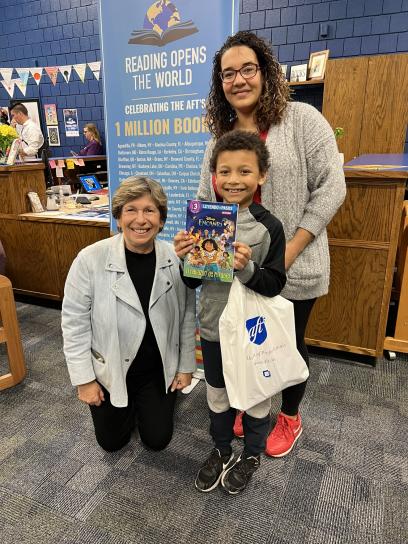The family dog recently joined Tiffany Nickel’s one-on-one virtual reading session with her third-grade student, along with the student’s mom, his little brother and his middle school-aged stepsister.
“The dog crawled up on the couch and curled up with the rest of the family,” says Nickel, a special education teacher at Chisholm Trail Elementary in Wichita, Kan. “That’s when I knew this was impacting more than just my student’s reading skills.”
The United Teachers of Wichita has been hosting the one-on-one virtual reading sessions with select students since September, with the intention of helping kids whose reading skills need an extra boost. Each student gets to take home a brand-new book every week, courtesy of AFT’s Reading Opens the World initiative, and schools provide internet-ready devices to make the sessions possible. But what was intended to be 30 minutes of reading aloud together has turned into a prized half-hour of joy for kids, a helping hand for working parents, and a crucial connection point for entire families.
“I have one parent, who I know is struggling, and she asked me to please read to her daughter as much as I can,” says Gloria Pitts, who teaches English language learners at Cloud Elementary School in Wichita. “Another parent let me know there was a family issue that was making things tough, so her child was going to be calling in from a cousin’s backyard,” says Pitts. “For them to open up like that—that’s huge. These sessions have built relationships and trust with the families. They know they can reach out to me if they need to.”
Pitts has read to kids while they’re at church, in the back of the car, or on Saturdays to make time for soccer practices and dance classes. The sessions have become a half-hour of not-to-be-missed reading time.
“One student called me from the church cafeteria because his mom did not want him to miss the session. And if they’re at grandma’s house and grandma doesn’t have Wi-Fi, then I’ll call them on grandma’s cell, and we’ll read aloud that way,” Pitts says. “The kids don’t want to miss that time.”
And the time has paid off. Initially, UTW identified 62 third-graders across five schools whose reading scores indicated they might not pass the Grade 3 State Reading Assessment. After three months of one-on-one time, the 46 students who elected to participate gained an average of nearly 5 percentage points compared with third-grade readers nationally. And when compared with other third-graders also considered “at risk,” they gained nearly 10 percentage points.
The gains are measurable by more than just percentage points.
“I have one student who was super shy and did not like to read in front of me at all,” says America Sanchez, who teaches English language learners. “Since we started reading, she has just bloomed. She is so excited to read. Reading was hard for her, and she would never try to sound out words that she didn’t know; but now she does. She actually loves reading.”
Nickel has seen the same progress with her students.
She describes her second session with one student: “He got a book out of his room and read it aloud to me. That was the first time he had ever read aloud to anyone,” she says. “At our third session, he got really into the new book he got that week—an adventure book that lets kids make choices—and he was asking questions and would go back and choose different options.”
That same student took his computer into the kitchen so he could show Nickel the chicken pot pie his mother had made for dinner. Another student told her he had a new book he wanted to read to her. He ended up making up an entire story on the spot.
“That was his new book—the story he made up to tell me. To see his enjoyment in storytelling was so great. That’s all we want—to develop that relationship and get them to enjoy stories and reading,” Nickel says.
The joy comes through in each session, especially with one particular third-grader, she says: “Each time, he asks for just one more page.”
[Melanie Boyer]

